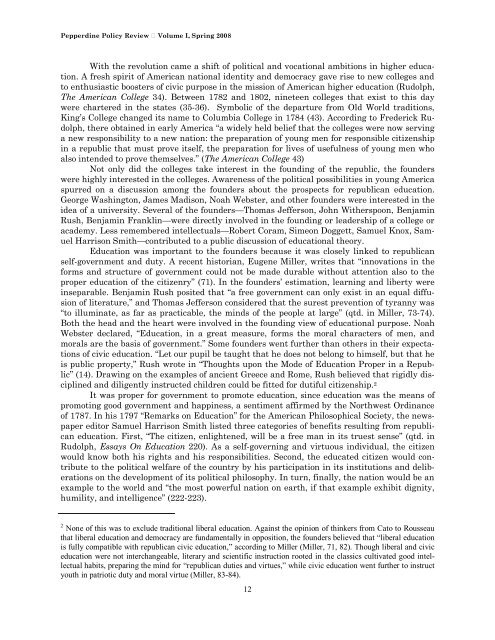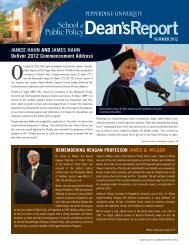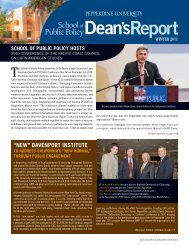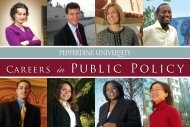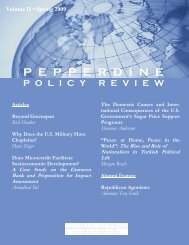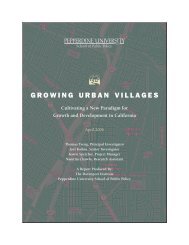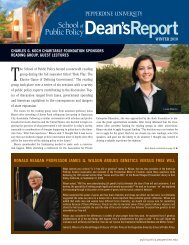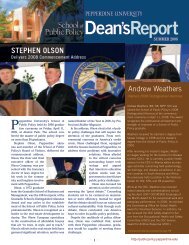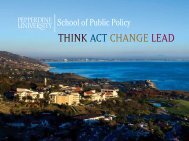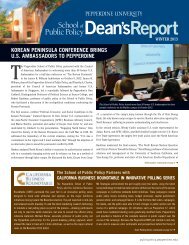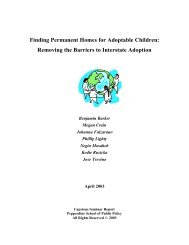Pepperdine University School of Public Policy
Pepperdine University School of Public Policy
Pepperdine University School of Public Policy
Create successful ePaper yourself
Turn your PDF publications into a flip-book with our unique Google optimized e-Paper software.
<strong>Pepperdine</strong> <strong>Policy</strong> Review Volume I, Spring 2008<br />
With the revolution came a shift <strong>of</strong> political and vocational ambitions in higher education.<br />
A fresh spirit <strong>of</strong> American national identity and democracy gave rise to new colleges and<br />
to enthusiastic boosters <strong>of</strong> civic purpose in the mission <strong>of</strong> American higher education (Rudolph,<br />
The American College 34). Between 1782 and 1802, nineteen colleges that exist to this day<br />
were chartered in the states (35-36). Symbolic <strong>of</strong> the departure from Old World traditions,<br />
King’s College changed its name to Columbia College in 1784 (43). According to Frederick Rudolph,<br />
there obtained in early America “a widely held belief that the colleges were now serving<br />
a new responsibility to a new nation: the preparation <strong>of</strong> young men for responsible citizenship<br />
in a republic that must prove itself, the preparation for lives <strong>of</strong> usefulness <strong>of</strong> young men who<br />
also intended to prove themselves.” (The American College 43)<br />
Not only did the colleges take interest in the founding <strong>of</strong> the republic, the founders<br />
were highly interested in the colleges. Awareness <strong>of</strong> the political possibilities in young America<br />
spurred on a discussion among the founders about the prospects for republican education.<br />
George Washington, James Madison, Noah Webster, and other founders were interested in the<br />
idea <strong>of</strong> a university. Several <strong>of</strong> the founders—Thomas Jefferson, John Witherspoon, Benjamin<br />
Rush, Benjamin Franklin—were directly involved in the founding or leadership <strong>of</strong> a college or<br />
academy. Less remembered intellectuals—Robert Coram, Simeon Doggett, Samuel Knox, Samuel<br />
Harrison Smith—contributed to a public discussion <strong>of</strong> educational theory.<br />
Education was important to the founders because it was closely linked to republican<br />
self-government and duty. A recent historian, Eugene Miller, writes that “innovations in the<br />
forms and structure <strong>of</strong> government could not be made durable without attention also to the<br />
proper education <strong>of</strong> the citizenry” (71). In the founders’ estimation, learning and liberty were<br />
inseparable. Benjamin Rush posited that “a free government can only exist in an equal diffusion<br />
<strong>of</strong> literature,” and Thomas Jefferson considered that the surest prevention <strong>of</strong> tyranny was<br />
“to illuminate, as far as practicable, the minds <strong>of</strong> the people at large” (qtd. in Miller, 73-74).<br />
Both the head and the heart were involved in the founding view <strong>of</strong> educational purpose. Noah<br />
Webster declared, “Education, in a great measure, forms the moral characters <strong>of</strong> men, and<br />
morals are the basis <strong>of</strong> government.” Some founders went further than others in their expectations<br />
<strong>of</strong> civic education. “Let our pupil be taught that he does not belong to himself, but that he<br />
is public property,” Rush wrote in “Thoughts upon the Mode <strong>of</strong> Education Proper in a Republic”<br />
(14). Drawing on the examples <strong>of</strong> ancient Greece and Rome, Rush believed that rigidly disciplined<br />
and diligently instructed children could be fitted for dutiful citizenship. 2<br />
It was proper for government to promote education, since education was the means <strong>of</strong><br />
promoting good government and happiness, a sentiment affirmed by the Northwest Ordinance<br />
<strong>of</strong> 1787. In his 1797 “Remarks on Education” for the American Philosophical Society, the newspaper<br />
editor Samuel Harrison Smith listed three categories <strong>of</strong> benefits resulting from republican<br />
education. First, “The citizen, enlightened, will be a free man in its truest sense” (qtd. in<br />
Rudolph, Essays On Education 220). As a self-governing and virtuous individual, the citizen<br />
would know both his rights and his responsibilities. Second, the educated citizen would contribute<br />
to the political welfare <strong>of</strong> the country by his participation in its institutions and deliberations<br />
on the development <strong>of</strong> its political philosophy. In turn, finally, the nation would be an<br />
example to the world and “the most powerful nation on earth, if that example exhibit dignity,<br />
humility, and intelligence” (222-223).<br />
2 None <strong>of</strong> this was to exclude traditional liberal education. Against the opinion <strong>of</strong> thinkers from Cato to Rousseau<br />
that liberal education and democracy are fundamentally in opposition, the founders believed that “liberal education<br />
is fully compatible with republican civic education,” according to Miller (Miller, 71, 82). Though liberal and civic<br />
education were not interchangeable, literary and scientific instruction rooted in the classics cultivated good intellectual<br />
habits, preparing the mind for “republican duties and virtues,” while civic education went further to instruct<br />
youth in patriotic duty and moral virtue (Miller, 83-84).<br />
12


